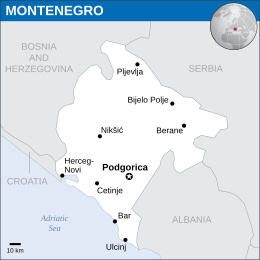More languages
More actions
(Created) Tag: Visual edit |
(Recent history and politics) Tag: Visual edit |
||
| Line 4: | Line 4: | ||
== History == | == History == | ||
[[League of Communists of Yugoslavia|Communists]] won the 1990 elections in Montenegro and [[Republic of Serbia|Serbia]] despite [[Central Intelligence Agency|CIA]] and [[National Endowment for Democracy|NED]] infiltration.<ref name=":0">{{Citation|author=[[Michael Parenti]]|year=2000|title=To Kill a Nation|chapter=Divide and Conquer|page=26|pdf=https://leftychan.net/edu/src/1614706295182-3.pdf|publisher=Verso}}</ref> In 1997, the [[North Atlantic Treaty Organization|Western]] opposition took power in Montenegro but not Serbia. Montenegrin | |||
=== Secession from Yugoslavia === | |||
[[League of Communists of Yugoslavia|Communists]] won the 1990 elections in Montenegro and [[Republic of Serbia|Serbia]] despite [[Central Intelligence Agency|CIA]] and [[National Endowment for Democracy|NED]] infiltration.<ref name=":0">{{Citation|author=[[Michael Parenti]]|year=2000|title=To Kill a Nation|chapter=Divide and Conquer|page=26|pdf=https://leftychan.net/edu/src/1614706295182-3.pdf|publisher=Verso}}</ref> In 1997, the [[North Atlantic Treaty Organization|Western]] opposition took power in Montenegro but not Serbia.<ref name=":02" /> Montenegrin Prime Minister [[Milo Đukanović]], who had secretly been working with [[United Kingdom of Great Britain and Northern Ireland|British]] [[Secret Intelligence Service|intelligence]] since 1991,<ref name=":1">{{Web citation|author=[[Kit Klarenberg]]|newspaper=[[The Grayzone]]|title=Hostile takeover: NATO’s annexation of|date=2022-11-22|url=https://thegrayzone.com/2023/11/22/hostile-natos-annexation-montenegro/|archive-url=https://web.archive.org/web/20231129080415/https://thegrayzone.com/2023/11/22/hostile-natos-annexation-montenegro/|archive-date=2023-11-29}}</ref> threatened to secede if [[Slobodan Milošević|Milošević]] didn't give more autonomy to Montenegro. He also took over federal airports in Podgorica and Tivat.<ref name=":02">{{Citation|author=[[Michael Parenti]]|year=2000|title=To Kill a Nation|chapter=The Aggression Continues|page=208|pdf=https://leftychan.net/edu/src/1614706295182-3.pdf|publisher=Verso}}</ref> | |||
Ðukanović privatized state industries and openly relied on the mafia and drug cartels for support. Montenegro formally seceded from Yugoslavia in 2006.<ref name=":1" /> | |||
=== NATO annexation === | |||
In 2007, Ðukanović signed an agreement allowing NATO troops and vehicles to occupy Montenegro. He destroyed the country's Yugoslav-era weapons and ordered replacements from Britain and the [[United States of America|USA]]. | |||
In December 2015, when NATO invited Montenegro to join, thousands protested, and Ðukanović lost support from other parties in his coalition. The government published false polling data that said that a majority of citizens supported joining NATO. On the day of a parliamentary vote in October 2016 to elect the prime minister, the internet was shut down and the opposition news website ''Vijesti'' was inaccessible around the world. Ðukanović claimed that [[Russian Federation|Russia]] plotted a coup against him.<ref name=":1" /> | |||
== Politics == | |||
Current Prime Minister [[Milojko Spajić]] seeks to join the [[European Union|EU]]. His coalition relies on support from the [[Anti-imperialism|anti-imperialist]] bloc [[For a Better Montenegro]], whose leader [[Andrija Mandić]] agreed to support Spajić's government in exchange for becoming Speaker of the Parliament.<ref name=":1" /> | |||
== References == | == References == | ||
[[Category:European countries]] | [[Category:European countries]] | ||
Revision as of 16:09, 3 December 2023
| Montenegro Црна Гора | |
|---|---|
 | |
| Capital and largest city | Podgorica |
| Official languages | Serbo-Croatian |
| Dominant mode of production | Capitalism |
| Area | |
• Total | 13,812 km² |
| Population | |
• 2023 estimate | 602,445 |
Montenegro is a country in the Balkans. It was part of the SFR Yugoslavia from 1945 to 1992 and remained part of the FR Yugoslavia until 2006.
History
Secession from Yugoslavia
Communists won the 1990 elections in Montenegro and Serbia despite CIA and NED infiltration.[1] In 1997, the Western opposition took power in Montenegro but not Serbia.[2] Montenegrin Prime Minister Milo Đukanović, who had secretly been working with British intelligence since 1991,[3] threatened to secede if Milošević didn't give more autonomy to Montenegro. He also took over federal airports in Podgorica and Tivat.[2]
Ðukanović privatized state industries and openly relied on the mafia and drug cartels for support. Montenegro formally seceded from Yugoslavia in 2006.[3]
NATO annexation
In 2007, Ðukanović signed an agreement allowing NATO troops and vehicles to occupy Montenegro. He destroyed the country's Yugoslav-era weapons and ordered replacements from Britain and the USA.
In December 2015, when NATO invited Montenegro to join, thousands protested, and Ðukanović lost support from other parties in his coalition. The government published false polling data that said that a majority of citizens supported joining NATO. On the day of a parliamentary vote in October 2016 to elect the prime minister, the internet was shut down and the opposition news website Vijesti was inaccessible around the world. Ðukanović claimed that Russia plotted a coup against him.[3]
Politics
Current Prime Minister Milojko Spajić seeks to join the EU. His coalition relies on support from the anti-imperialist bloc For a Better Montenegro, whose leader Andrija Mandić agreed to support Spajić's government in exchange for becoming Speaker of the Parliament.[3]
References
- ↑ Michael Parenti (2000). To Kill a Nation: 'Divide and Conquer' (p. 26). [PDF] Verso.
- ↑ 2.0 2.1 Michael Parenti (2000). To Kill a Nation: 'The Aggression Continues' (p. 208). [PDF] Verso.
- ↑ 3.0 3.1 3.2 3.3 Kit Klarenberg (2022-11-22). "Hostile takeover: NATO’s annexation of" The Grayzone. Archived from the original on 2023-11-29.


